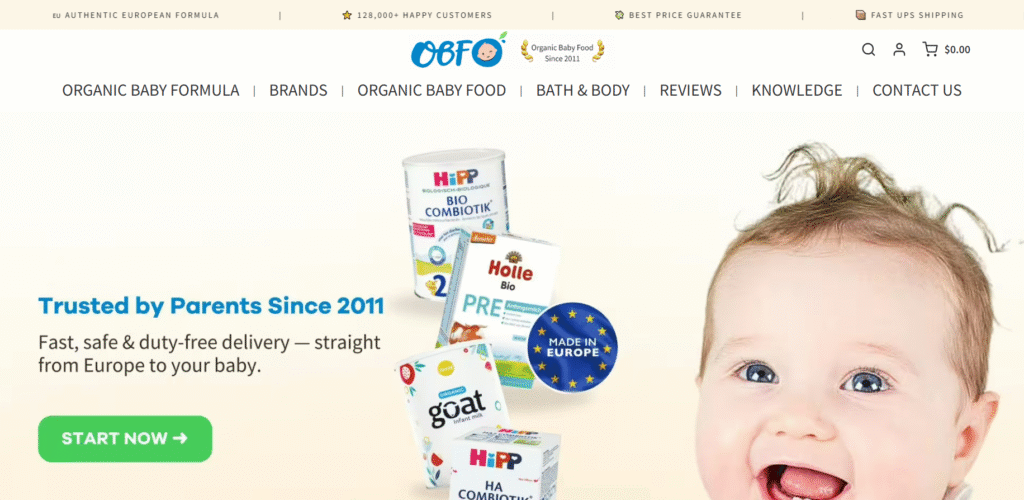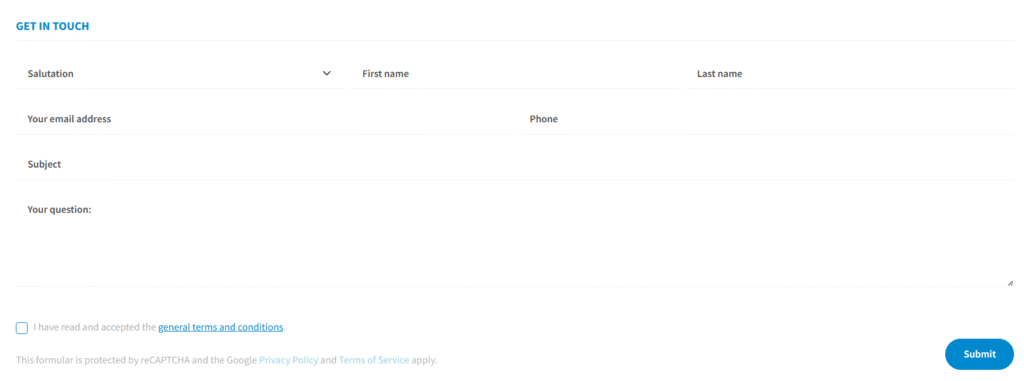Organic Baby Food Affiliate Program: How to Make Money With It
Looking to tap into the profitable baby products niche? The Organic Baby Food affiliate program offers a 10% commission on premium European baby formula and products. Parents actively search for trusted organic options, making this a compelling opportunity for affiliate marketers in the parenting, health, and wellness spaces.

Quick Program Stats
💰 Commission: 10% per sale (up to 15% at higher volumes)
🍪 Cookie Duration: 30 days
💳 Payment Terms: Monthly via PayPal
🎯 Product Range: Formula, baby food, care products
🌍 Target Market: Primarily European countries
Why the Organic Baby Food Program Works
The baby products market is recession-resistant. Parents don’t compromise when it comes to their children’s nutrition, especially when organic and European-quality products are involved. Organic Baby Food sells premium brands like Holle, Loulouka, Lebenswert, and Hipp—names that health-conscious parents actively research and purchase.
Here’s the math that makes this attractive. If you’re promoting products with an average order value of $100, you’re earning $10 per conversion. Send 10 qualified customers monthly and you’re at $100. Scale to 100 customers and you’ve got $1,000 in monthly recurring revenue. The key word here is “qualified”—parents searching for these specific European brands have high purchase intent.
The program stands out because it targets a specific demographic willing to pay premium prices. We’re not talking about budget formula here. These are parents who’ve done their research and want ingredients closest to breast milk. That purchasing power translates to higher order values and better commission potential.
Understanding Your Target Audience
Your ideal audience isn’t just “parents.” It’s health-conscious parents who prioritize organic products and trust European quality standards. These are typically first-time parents, ages 28-40, with disposable income. They’re reading parenting blogs, joining Facebook groups about baby-led weaning, and watching YouTube videos comparing formula brands.
They’re dealing with specific pain points. Concerns about formula ingredients. Anxiety about choosing the right nutrition for their baby. Confusion about European versus American formula standards. Questions about shipping times and product authenticity. Your content needs to address these concerns directly.
These parents are researchers. They don’t impulse buy when it comes to baby nutrition. They read multiple reviews, join online communities, and ask for recommendations. This means your content strategy needs depth and trust-building, not quick-hit sales tactics.
Step-by-Step Promotion Strategy
Getting Started with Your Application
Join the program through their affiliate network. The approval process is straightforward—they’re looking for content creators with relevant audiences. Having an established blog or social presence in parenting, health, or organic living helps, but beginners with quality content plans can get approved too.
Once approved, you’ll get access to promotional materials including banners and tracking tools. Familiarize yourself with the product range beyond just formula. They sell cereals, snacks, fruit pouches, and baby care products. More product knowledge means more content angles.
Building Your Content Foundation
Your content strategy should center on comparison and education. Create detailed reviews comparing Holle versus Loulouka. Write guides on understanding European formula regulations. Develop content around “best organic baby food for 6-month-olds” and similar specific queries.
Product comparison posts perform exceptionally well. Parents want to know differences between brands. A post titled “Holle vs Hipp: Which European Formula is Right for Your Baby?” targets high-intent traffic. These comparisons should be thorough—ingredients, taste, digestibility, price per ounce. Include your affiliate links naturally within the comparison tables.
SEO targeting works powerfully here because parents research these specific brand names. Target keywords like “Holle formula review,” “where to buy Loulouka,” “best European baby formula,” and “organic baby food delivery.” These searches indicate someone ready to purchase.
Traffic Generation Tactics That Convert
Organic search is your best friend with this program. Parents trust organic search results when researching baby products. Building comprehensive guides and comparison content ranks well and builds authority. Focus on long-form content that actually answers questions completely.
Pinterest drives significant traffic in the parenting niche. Create pins showing organic baby food prep ideas, weaning schedules using these products, and ingredient comparison graphics. Pinterest users are planners—exactly the demographic buying these products. Link your pins to detailed blog posts with your affiliate links embedded.
Facebook groups are goldmines if approached correctly. Don’t spam groups with links. Instead, become a valuable community member who happens to have written comprehensive guides. When someone asks “What’s the best organic formula?” you can genuinely help by pointing to your detailed comparison post.
YouTube works differently here. Parents watch baby feeding videos constantly. Create content showing how to prepare these formulas properly, what to expect when switching brands, or storage tips for organic baby food. Mention the products naturally and include affiliate links in descriptions.
Paid Traffic Considerations
Facebook and Instagram ads work for this niche but require careful targeting. Focus on new parent demographics, people interested in organic living, and followers of natural parenting pages. Your ad creative should emphasize the European quality standards and organic ingredients.
Google Ads can work but competition is fierce for baby formula keywords. Better to target long-tail searches like “European organic formula that’s closest to breast milk” where you’ll find parents with specific needs and lower cost-per-click.
Email Marketing for Long-Term Revenue
Building an email list in the baby products niche creates recurring revenue potential. Parents need products consistently—formula, baby food, snacks. Create a lead magnet like “The Complete Guide to European Baby Formula” or “Organic Baby Food Introduction Schedule” to capture emails.
Your email sequence should educate first, sell second. Send valuable content about introducing solids, understanding ingredients, and making informed feeding choices. Weave in product recommendations with your affiliate links naturally. Parents appreciate helpful information more than constant sales pitches.
Real Implementation Examples
Let’s look at how successful affiliates approach this. One effective angle is the “American mom living abroad” perspective. Content framing: “Why I Choose European Formula for My Baby” combined with specific brand experiences. This builds authenticity while naturally incorporating affiliate recommendations.
Another working approach is the “formula journey” content series. Document trying different Organic Baby Food brands with your own child, noting differences in digestion, sleep patterns, and overall satisfaction. Real experiences resonate more than generic product descriptions.
Blog post example that converts: “My 3-Month Experience with Holle Formula: Honest Review, Costs, and Where to Buy.” This targets both the brand name and buying intent. Include actual cost breakdowns, feeding amounts, and comparison to what you tried before. Embed your affiliate link when discussing where to purchase.
Social media angles that work include quick posts in parent groups answering common questions. “Has anyone tried switching from [American brand] to Holle? Here’s my experience…” with a link to your detailed blog post. The key is providing value first, affiliate promotion second.
Challenges You’ll Actually Face
Let’s be honest about the obstacles. The 30-day cookie duration is shorter than ideal. Parents often research for weeks before purchasing, meaning they might click your link but not buy within your cookie window. This makes retargeting and email list building even more critical.
Competition exists around these brand names. You’ll find established parenting blogs and influencers already ranking for key terms. Success requires either finding underserved angles or creating genuinely superior content. “Me too” content won’t cut it here.
Shipping concerns from European suppliers can create hesitation. Your content should address delivery times, shipping costs, and product authenticity concerns directly. Parents worry about these factors, so providing clear information builds trust and increases conversions.
The niche audience is smaller than mainstream baby products. You won’t have the massive traffic potential of promoting Amazon baby items. But the trade-off is higher-value customers willing to pay premium prices, which can mean better conversion rates on targeted traffic.
Maximizing Your Commission Potential
The program offers commission increases at higher sales volumes, reaching up to 15%. This reward structure means consistency pays off. Track which content drives sales and double down on those angles. If comparison posts convert better than general baby feeding guides, create more comparisons.
Bundle recommendations work well. Instead of just promoting formula, create content around complete feeding solutions using multiple Organic Baby Food products. “My Organic Baby Feeding Essentials: Formula, Snacks, and Cereals I Trust” lets you earn commissions across product categories.
Seasonal opportunities exist even in evergreen niches. Back-to-school times mean parents researching baby food for daycare. Holiday gift guides can include baby care products. Summer content around travel-friendly organic snacks. Timing content around these moments increases relevance and conversions.
Who This Program Isn’t For
If your audience is budget-conscious parents looking for the cheapest feeding options, this isn’t your program. Organic Baby Food sells premium products at premium prices. Trying to force-fit this offer to the wrong audience wastes everyone’s time.
Affiliates wanting quick wins should look elsewhere. This niche requires trust-building and education. You won’t see overnight success unless you’re already established in the parenting space. The payoff comes from consistent effort building authority around baby nutrition topics.
If you’re uncomfortable with the 30-day cookie duration, programs in other niches offer longer tracking windows. This is industry-standard for baby products but worth considering against your typical sales cycle.
Getting Started Today

The opportunity here is clear. Parents need trusted sources for organic baby products. European formula brands have strong reputations but limited promotion in English-speaking markets. Position yourself as the go-to resource for understanding and accessing these products.
Start by creating one comprehensive cornerstone piece. A complete guide to European organic baby formula comparing all four brands Organic Baby Food carries. Make it the definitive resource. Then build supporting content around specific questions and concerns that link back to your main guide.
Focus on building trust before pushing sales. Share real experiences, acknowledge both positives and limitations of different products, and provide value even to readers who don’t click your links. This approach builds authority that converts better long-term than aggressive selling.
The program provides the promotional tools you need. Combined with the right content strategy targeting qualified traffic, you can build a sustainable income stream in a recession-resistant niche. Parents will always need to feed their babies, and the demand for quality organic options continues growing.
Join the Organic Baby Food affiliate program here and start building your parenting niche revenue stream.
